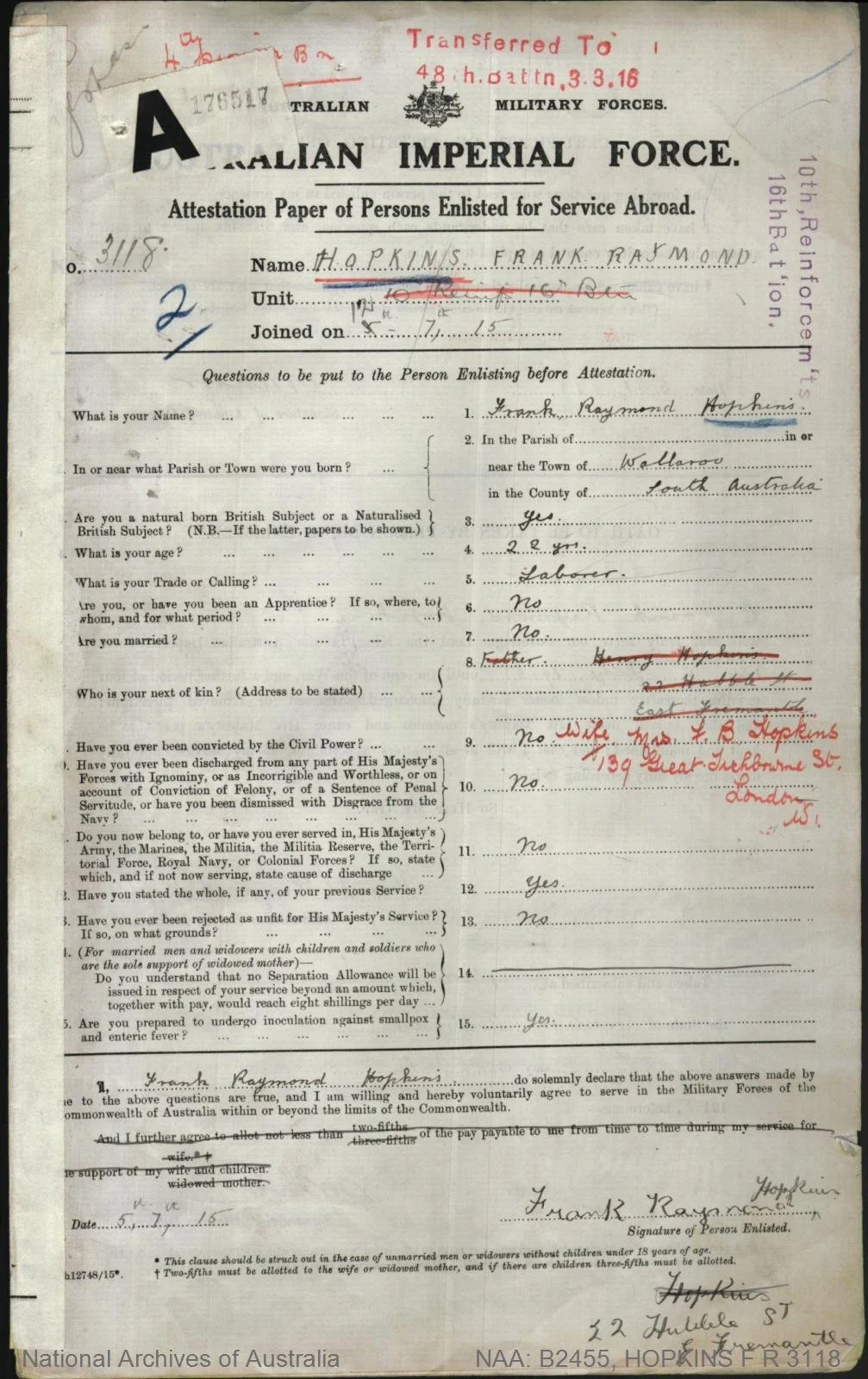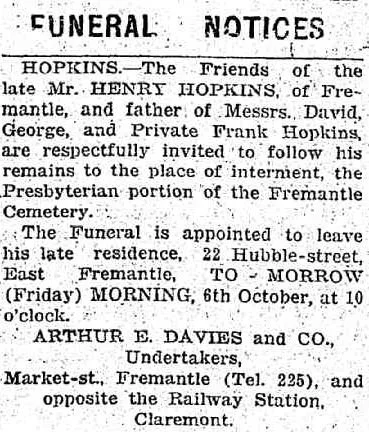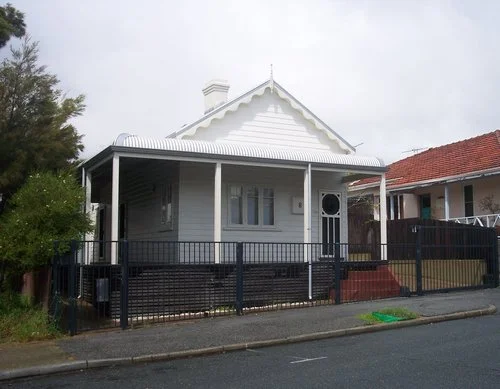Rank: Lance Sergeant
Regimental Number: 450
Place of Birth: Bunbury, Western Australia
Address: Hill Street, East Fremantle, Western Australia
Next of Kin: Father, Richard G Kirton
Enlistment Date: 14 August 1914
Unit Name: 11th Battalion, D Company
Age embarkation: 20
Marital Status: Single
Occupation: Bank clerk
Date of Death: 18 February 1916
Place of Burial: Cairo War Memorial Cemetery (Row D, Grave No. 321), Egypt
History
There are three Kirtons on the East Fremantle Roll of Honour: Alec, his brother Gervase (known as Roland), and their sister Dora, the only woman on the Roll of Honour.
They were the children of chemist and former brickmaker, Richard Gervase Kirton and his wife Mary Anne nee Mann. Gervase and Dora were born in England before the family came to Western Australia in the late 1880s. The family initially lived in Glen Iris, near Bunbury, where Alec was born in 1893 and where Richard established The Kirton Patent Pottery Co in 1902. In 1904 they moved up to Belmont where Richard became a town councillor and opened his pottery on a new site on Grandstand Road, near the river, in July 1904.
Though it was the first pottery in Perth and Richard made a diverse range of roofing tiles, terracotta horticultural pots and agricultural pipes, the pottery quietly went into liquidation in February 1906. Another pottery took it over and, in the 1930s, became Brisbane & Wunderlich. Today the kilns and chimneys, dating from Kirton Patent Pottery Co’s time, are heritage-listed; a significant feature of Belmont’s history.
After the failure of his pottery Richard turned his hand back to chemistry, took up premises in Central Chambers, High Street, Fremantle, and moved his family to East Fremantle.
Alec (20) was a bank clerk and still living at home when he enlisted at the outbreak of war in August 1914. Assigned to the 11th Battalion, Alec survived the landing at Gallipoli but a dilated heart saw him evacuated to the 1st Australian Stationary Hospital in Mudros on Lemnos Island, Greece, on 1 June 1915, and on to Alexandria where he was admitted to hospital on 6 June. In August 1915, instead of being sent back to Gallipoli, he was sent for training at the Imperial School of Instruction (for Officers) in Zeitoun, Egypt. He did very well and, on 9 January 1916, was promoted to regimental quartermaster sergeant.
Six weeks later though, on 18 February, Alec was fatally injured in a bomb blast at the school, and died shortly afterwards, aged just 21.
Roland (33), an assistant chemist, enlisted a few weeks after Alec, in September 1914. He, his wife Elizabeth, and their two small children Roma and Gervase, lived in Menzies, but he enlisted in Perth in September 1914. He was assigned to the Australian Army Medical Corps and arrived in Egypt in late December 1915, a few weeks after Alec. He served with the 2nd Australian Stationary Hospital (2ASH) at Mena Camp outside Cairo, where Alec was also camped. They would have seen each other around camp and made their farewells in March 1915, when the 11th Battalion was sent to wait in Mudros Harbour at Lemnos for the Gallipoli campaign to begin.
Back home, on 18 April, Roland’s tiny daughter Roma (3) died in Menzies Hospital. He would have received the news shortly thereafter, but there was no time to mourn her loss for, on 19 April, Gervase and the 2ASH packed up and moved to Mudros, arriving just as the troops were leaving Lemnos for Gallipoli. There, he dealt with the influx of sick and wounded from Gallipoli while his wife, Elizabeth, and son, Gervase (2), moved down to 121 George Street, East Fremantle, to be near the rest of his family. In May, some comfort would have come from seeing Alec for the few days he was at 1AGH, nearby.
After the Gallipoli campaign dragged to a close Roland was sent to Tel-el-Kebir, Egypt, where he heard his brother Alec had been killed in the bomb blast at Zeitoun. He became ill and was seriously depressed; his nerves had been shattered and he was unable to stop fretting about his family. After he was diagnosed with debility, another name for shell shock, a line was drawn under his war service. He was assigned nursing and mess duties on the Runic and returned to Australia in May 1916. He was discharged on 4 July.
Dora (31) enlisted in July 1915. She had trained for three and a half years at Fremantle Public Hospital, qualifying in 1911 with her Medical and Surgical Certificates, and subsequently worked as matron at a private hospital.
She initially nursed on Hospital Transport Ships, nursing the sick and wounded returning to Australia from the front. Later, she served in hospitals in Egypt, convalescent homes in England and in tent hospitals and casualty clearing stations in on the Western Front. She fell ill with influenza in December 1916 in England, but swiftly recovered and resumed duty.
In France on 9 July 1918 she suffered burns to her face and hair when a small (methylated) spirit stove exploded as she lit it. She recovered, and resumed duty on 6 August. Three weeks later she was posted to the 57th Casualty Clearing Station, and returned to the 25AGH on 22 September where she was soon after promoted to sister.
In late-November 1918, in France, Dora was hospitalised with a second bout of influenza at Wimereux, where she was also subsequently diagnosed with debility. With the Armistice having been signed and the war over, she was sent to the newly-opened nurses’ convalescent home, the superb Villa Casa del Mare, Cabbe Roquebrune, for Christmas 1918. After this well-earned rest, Dora rejoined her unit on 6 January 1919.
Dora spent the majority of 1919 nursing in England, but took the opportunity to attend a cooking course at the British School of Cookery in Regent Street, London, between 1 April and 23 June, and enjoyed another month’s leave in England from mid-August. She returned to Australia on the Benalla in November 1919, choosing to be demobilized in Victoria, where she was finally discharged on 21 June 1920.
The next year, in NSW, Dora married wool classer Cecil Alcorn, from Jerrys Plain’s, NSW. Seven years her junior, Cecil had served with the 30th Battalion, and studied to become a commissioned lieutenant. He lost his right leg after being wounded in action in October 1918, and was awarded a Belgian Croix de Guerre for conspicuous services in the field. Cecil became the head teacher in the Technical Education Branch’s Sheep and Wool Department and, for most of the rest of Cecil’s life, they lived in a gracious Federation home in Summer Hill, just outside of Sydney.
Dora never returned to live in Western Australia. Cecil retired in 1953 and died in Summer Hill in 1957, aged 66. Dora survived Cecil by seven years and died in Artarmon, NSW, in 1965, aged 81.
Roland never returned to live in Western Australia either. After his return in 1916 he donned khakis again in January 1918, and worked as a recruiting organiser but, after the war, he and his wife Elizabeth, son Gervase, and their baby daughter Loma, born in June 1918, moved to Townsville, Queensland, where he died in 1976, aged 95.
Researched and written by Shannon Lovelady for www.streetsofeastfreo







